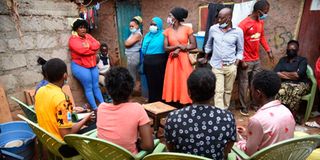Set up rehab centres for adolescent drug addicts

Five of the six students from Karen C Girls Secondary School alleged to be peddling drugs.
Statistics point to a growing concern in substance use among teens. It is important to appreciate that this scourge needs a change in tack if we are to win the war against it.
The Ministry of Education, in partnership with the National Authority for the Campaign against Alcohol and Drug Abuse (Nacada), recently launched the National Guidelines for Alcohol and Substance Use Prevention and Management in Basic Education Institutions.
Providing a plan in responding effectively to issues related to alcohol and substance use in schools, their implementation will support creation of learner-friendly environments and promote transition, completion and ethical citizenship. They spell out effective preventive and management approaches.
An adolescent-specific rehab facility has many benefits for teenagers struggling with substance abuse. Besides a treatment programme that provides medical drug detox and counselling, it also helps to build self-esteem and confidence. The 30-90-day inpatient rehab programmes are beneficial to teens needing a safe, structured environment.
Alcohol
The teens will continue to benefit from programmes that boost their confidence through challenge activities and may also offer fully accredited academic programmes, beneficial to those who fall behind in school or need additional academic help. They help teens to not only heal the body but also mind and spirit and to better understand that sobriety is part of a happier, healthier long-term lifestyle.
The guidelines address thematic areas such as supply reduction, whose goal is to eliminate access and availability of alcohol and substances in learning institutions. They touch on preventive education, provided in the broader context of a health education programme and delivered in the context of a supportive whole school environment targeting teachers, non-teaching staff, parents and learners.
They detail recommended procedures in managing incidents involving alcohol, tobacco and drug use in these institutions — including counselling, treatment and support.
Behavioural change
For parents of teenagers who could benefit from treatment, finding the right adolescent-specific programme can make a big difference for their teen’s successful recovery. Such treatment programmes should also offer family counselling; the centre provides a safe environment for families to interact.
It’s difficult to say rehab is a failure if a teen relapses; relapse rates for teens and adults are high. That doesn’t mean it’s ineffective. Behavioural change and medical intervention can treat those diseases. The goal of rehab is to prepare a teenager to abstain from alcohol or drug use and live a high-functioning life. The success in reaching that goal is usually determined by the teen’s support system, commitment to treatment and willingness to change.





